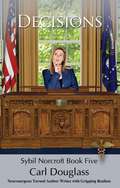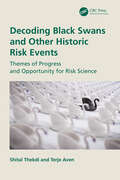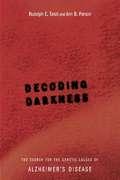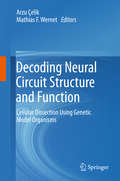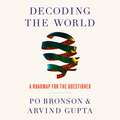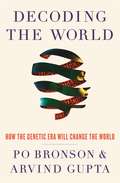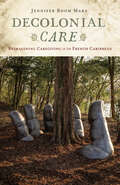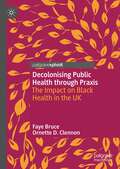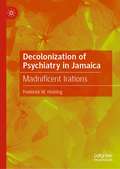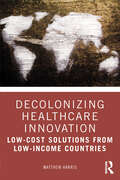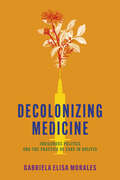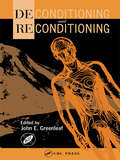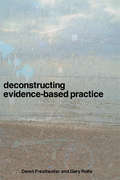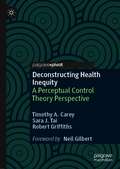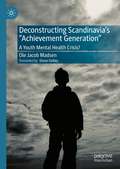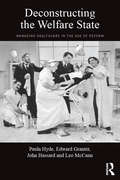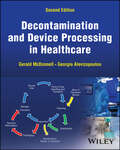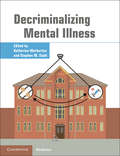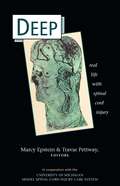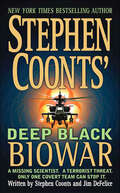- Table View
- List View
Decisions: Spy to Surgeon General to a Threat of Impeachment (Sybil Norcroft Ser. #5)
by Carl DouglassSybil Norcroft, M.D., Ph.D., F.A.C.S. has been nominated and confirmed to be the Surgeon General of the United States after a stellar career as a practicing and academic neurosurgeon and as a media darling for Wolf News. But...all is not what it seems to be. Dr. Norcroft is also a consummate spy whose secret life threatens her family and her very existence. The latest threat is to the world, and Sybil must use her role as the Surgeon General to gain access to the secret world of those who plan mass destruction. This turns out not to be an arms-length involvement. No, Sybil must fight.
Deckungsbeitragsrechnung für Krankenhäuser: Analyse – Verfahren – Praxisbeispiele (Controlling im Krankenhaus)
by Winfried ZappDie Deckungsbeitragsrechnung ist eine Teilkostenrechnung und kann unterschiedlich gestaltet und ausgerichtet sein, wobei sich unter anderem kostenträger- und kostenstellenorientierte Verfahren unterscheiden lassen. In diesem Buch werden beide Verfahren exemplarisch entwickelt und mit Zahlen und Daten jeweils eines ausgewählten Beispiel-Krankenhauses anwendungsorientiert dargestellt. Die kostenträgerorientierte Variante wird aus den Vorgaben des Kalkulationshandbuches konzipiert, so dass eine schnelle Herleitung mit den Kalkulationsdaten möglich ist. Die kostenstellenorientierte Deckungsbeitragsrechnung wird ebenfalls in einem Modellhaus anwendungsorientiert hergeleitet und mit den verschiedenen Analysemöglichkeiten dargestellt. In einem dritten Beispiel wird herausgearbeitet, wie ein Controlling aus einer reinen Vollkostenrechnung Analysedaten bereitstellen kann. Somit werden unterschiedliche Verfahren differenziert vorgestellt, sodass deutlich wird, welche Arbeitsschritte notwendig sind, welche Analyse-Möglichkeiten sich daraus ergeben, um darauf aufbauend ein anwendungsorientiertes Controlling voranzutreiben und zu gestalten. Dieses Buch richtet sich an Führungskräfte in Krankenhäusern und Gesundheitseinrichtungen sowie an Studierende aus dem Bereich Gesundheitsmanagement, Controlling und Rechnungswesen.
Decluttered: Mindful Organizing for Health, Home, and Beyond
by Jenny AlbertiniHave you ever wondered why you can't summon the energy to declutter those piles of clothes on the floor? Do you wish you knew what policies your workplace could offer so everyone can think more clearly and feel better at work? Or maybe you've felt confused about which ideas even deserve your attention right now? You're not alone. And if you are ready for a change, this book is for you.Coming from a public health expert who spent over two decades designing health initiatives around the world, Decluttered is a mindful exploration of how and why clutter manifests in our lives–and what we can do about it. Jenny Albertini invites readers to explore decluttering from personal and empathetic angles while acknowledging how clutter does not only manifest as "stuff" in our homes, but also in our relationships and in our everyday lives. Blending stories and science with writing prompts and creativity exercises, this book will motivate readers to examine their relationship to their surroundings while reducing clutter for their health, in their homes, in their workplaces, and beyond. Jenny shares her own transformative journey of working in clinics in Africa and training under Marie Kondo, along with inspirational moments with clients from her years as professional organizer. Decluttered will leave its readers feeling: • Enlightened about underlying health issues related to clutter; • Aware of what to prioritize for their decluttering journey; and • Ready to take tangible steps that improve their work lives, home environments, and relationships.A refreshing addition to the well-being and home genres, Decluttered helps to reduce shame and supports readers to transform their cluttered lives and spaces into foundations for healthy, balanced and intentional living.Welcome to your world, decluttered.
Decoding Black Swans and Other Historic Risk Events: Themes of Progress and Opportunity for Risk Science
by Terje Aven Shital ThekdiThe field of risk science continues to learn from the long history of events to develop principles and practices that enable individuals, organizations, and societies to understand and manage future risk. Reflecting on these histories reminds us that risk and uncertainty are prevalent, yet it remains important to consider what is on the horizon: the possibility of future events, the consequences of those events, our vulnerability to those events, and how to recover from those events.Decoding Black Swans and Other Historic Risk Events offers a guide to understanding risk events and how to act before they occur. This book explores past risk events and analyzes how risk science principles apply to those events and studies whether current risk science concepts and approaches could potentially have avoided, reduced the impact, or supported recovery following the risk event. New insights are obtained by applying recent research progress in understanding and managing risk, considering aspects including quality of evidence, information, and misinformation in risk studies. The analysis results are used to identify how risk science approaches contribute to the overall management of risk and societal safety, and where improvements can be obtained, allowing the reader to possess a toolkit for identifying and planning for unsafe events.This title will be a critical read for professionals in the fields of occupational health and safety, risk management, civil engineering, mechanical engineering, energy, marine engineering, environmental engineering, business and management, and healthcare.
Decoding Cardiac Electrophysiology: Understanding the Techniques and Defining the Jargon
by Afzal SohaibThis book provides a concise overview of cardiac electrophysiology for cardiologists who are not electrophysiologists and for allied cardiovascular professionals, cardiology registrars and fellows who are new to the field. It familiarises them with the main procedures performed in the electrophysiology laboratory. Emphasis is placed on helping the reader develop a core understanding of how data is collected and interpreted in the electrophysiology laboratory, and how this is used to guide ablation for the commonest arrhythmias including AV nodal re-entry tachycardia, accessory pathways, atrial fibrillation and ventricular arrhythmias. Decoding Cardiac Electrophysiology: Understanding the Techniques and Defining the Jargon will translate some of the technical terminology and data frequently used by electrophysiologists into terms and concepts familiar to the wider cardiovascular community. This includes the interpretation of electrograms and 3D electro-anatomical maps of common arrhythmias. Accordingly, it offers a valuable resource for all non-electrophysiologists seeking a guide to the topic and for electrophysiology trainees establishing their core knowledge and skills in the field. The aim is that this should be the first book anyone new to the field should choose to read.
Decoding Darkness: The Search For The Genetic Causes Of Alzheimer's Disease
by Rudolph E. Tanzi Ann B. ParsonWorking from the intriguing hypothesis that Alzheimer's dementia is the result of a renegade protein-beta amyloid-Tanzi and others set out to find the gene responsible for its production. Decoding Darkness takes us deep into the minds and far-flung labs of many a prominent researcher, offering an intimate view of the high stakes of molecular genetics, the revolution that propels it, the obstacles that threaten to derail it, and the families whose lives are so dependent upon it. Tanzi and Parson ultimately reveal that Alzheimer's, like heart disease, may be effectively treated-even prevented.
Decoding Neural Circuit Structure and Function
by Arzu Çelik Mathias F. WernetThis book offers representative examples from fly and mouse models to illustrate the ongoing success of the synergistic, state-of-the-art strategy, focusing on the ways it enhances our understanding of sensory processing. The authors focus on sensory systems (vision, olfaction), which are particularly powerful models for probing the development, connectivity, and function of neural circuits, to answer this question: How do individual nerve cells functionally cooperate to guide behavioral responses? Two genetically tractable species, mice and flies, together significantly further our understanding of these processes. Current efforts focus on integrating knowledge gained from three interrelated fields of research: (1) understanding how the fates of different cell types are specified during development, (2) revealing the synaptic connections between identified cell types ("connectomics") using high-resolution three-dimensional circuit anatomy, and (3) causal testing of how identified circuit elements contribute to visual perception and behavior.
Decoding the World
by Arvind Gupta Po BronsonA vision of the future where the latest Silicon Valley tech meets cutting-edge genetics.Po Bronson and Arvind Gupta, venture capitalists from Silicon Valley, take everyday news headlines and decode them, leading us on a journey through their unique and highly entertaining view of the world. Each chapter is prefaced with a real-world headline from today's chaotic news cycle: Dying bees. Rogue planets. Beyond Meat. Glaciers melting. Bronson and Gupta decipher what's really going on behind these headlines, and why. They offer first-hand experience in funding technologies to solve these problems, most of which involve genetic engineering.But what the authors then do with that premise is always surprising and unexpected. One moment they are ripping it down to the bare bones physics or chemistry, and then they invoke history, philosophy, or psychology, all the while using joyful literary devices and storylines from popular movies. Decoding the World is the kind of book you get when you give two guys $40 million, a world full of messy big problems, a genetics laboratory to play in, and a set of Borges' collected works. After looking through their lens, you'll never see the world the same.(P)2020 Hachette Audio
Decoding the World: A Roadmap For The Questioner
by Arvind Gupta Po BronsonA vision of the future where the latest Silicon Valley tech meets cutting-edge genetics.Decoding the World is a buddy adventure about the quest to live meaningfully in a world with such uncertainty. It starts with Po Bronson coming to IndieBio.Arvind Gupta created IndieBio as a laboratory for early biotech startups trying to solve major world problems. Glaciers melting. Dying bees. Infertility. Cancer. Ocean plastic. Pandemics.As they travel around the world, finding scientists to join their cause, the authors bring their first-hand experience to the great mysteries that haunt our future. Natural resource depletion. Job-taking robots. China's global influence.Decoding the World is the kind of book you get when you give two guys $40 million, a world full of messy big problems, a genetics laboratory to play in, and a set of Borges' collected works. After looking through their lens, you'll never see the world the same.
Decolonial Care: Reimagining Caregiving in the French Caribbean (Critical Caribbean Studies)
by Jennifer Boum MakeDecolonial Care examines the relationship between the legacies of colonialism and the dynamics of caregiving that have emerged from the French Caribbean. Through a variety of media, including novels, graphic narratives, and curatorial discourse, this book explores four key contexts at the intersection of care and colonialism: care-focused gender roles, domestic service, nurturing human life and environments, and curation as caring. Decolonial Care argues that to imagine caregiving in the context of the French Caribbean means reckoning with intrinsically uncaring practices inherited from colonial rule that show disregard for human life and environments. Putting in dialogue postcolonial studies and care studies, this book elucidates how caring and uncaring have been historically shaped by colonialism, showing how media and narratives about the French Caribbean document the damaging impact of colonialism but also help develop decolonial approaches to care that sustain human life and livable environments.
Decolonising My Body: A Radical Exploration of Rituals and Beauty
by Afua HirschWhat can ancestral practices teach us about how to live fuller lives today? Upon turning forty, Afua Hirsch had an encounter that forever altered her preconceived notions of ancestry and body image, making her question everything from body-modification rituals such as tattoos and piercings to the foundations of sexuality, as well as attitudes towards puberty, ageing and death. This book charts her year-long journey of radical unlearning. Bringing together global scholarship, on-the-ground reportage, personal anecdotes, and interviews with beauty experts, practitioners, and service users, she reassesses notions of body image beyond those of the colonial, patriarchal gaze.
Decolonising Public Health through Praxis: The Impact on Black Health in the UK
by Ornette D. Clennon Faye BruceThis book provides an interdisciplinary analysis of UK African Diaspora health seekers and their sustained health inequalities in the health market. It translates their often-silenced voices into a decolonial praxis, where their experiences illuminate the hidden factors that have blighted change in health outcomes for these communities. The book excavates and breaks down the nature of these hidden factors, as historical patterns of behaviour that comprise whiteness over the longue durée. Using the lenses of decolonial and critical race studies, the book places whiteness within an ethical and moral framework in order to examine the hidden factors behind health inequalities. The book also looks at intersectionality and discusses whether it is actually fit for purpose as an analytical framework for discussing the health seeking behaviours of both Black men and Black women in relation to their unequal access to the health market.
Decolonization of Psychiatry in Jamaica: Madnificent Irations
by Frederick W. HicklingThis book traces the historical postcolonial journey of four generations of Jamaican psychiatrists challenging the European colonial ‘civilizing mission’ of psychiatric care. It details the process of deinstitutionizing patients with chronic mental illness using psychohistoriographic cultural therapy, by engaging them in creating sociodrama and poetry writing, not only to express and reverse the stigma contributing to their marginalized status, but also to reconnect them to a centuries-long history of oppression. The author thereby demonstrates that psychological decolonization requires a seminal understanding of the complex mental inter-relationship between slaves and slaveowners. Further, it is shown how the model analyzes the antipodal dialectic history of descendants of Africans enslaved in the New World by brutish British Imperialists suffering from the European psychosis of white supremacy. Drawing together a detailed description of the sociopoem Madnificent Irations, with an examination of Jamaica’s political and social history, and the author’s personal experience, this compelling work marks an important contribution to decolonial literature. It will be of particular interest to students and scholars of postcolonial studies, critical race theory, the history of psychology and community psychology.
Decolonizing Healthcare Innovation: Low-Cost Solutions from Low-Income Countries
by Matthew HarrisThis fascinating book offers a pathway for the NHS to adopt low-cost but effective innovations from areas of the world traditionally seen as beneficiaries rather than providers of help and support. In an era of increasing demand and dwindling resources, and where the COVID-19 pandemic has illustrated the structural limitations of the current system, the book provides examples of simple, frugal but high-quality alternatives to current practice. From orthopaedics to paediatrics, and mental health to plastic surgery, the book illustrates how low- and middle-income countries have found solutions to healthcare issues that are not only safe and clinically effective but also have the potential to save the NHS millions of pounds. Grounded in the contemporary debates of decolonization, it invites readers to question the culture and systems in global health that view low-income countries as solely passive recipients of aid. The volume will be essential reading for students and scholars across Public Health, Global Health, and Development Studies, as well as healthcare managers and policy makers in the UK and beyond.
Decolonizing Medicine: Indigenous Politics and the Practice of Care in Bolivia
by Gabriela Elisa MoralesDecolonizing Medicine examines Bolivian state-led efforts to decolonize health services during the administration of Evo Morales, Bolivia's first Indigenous president. Governing from 2006 to 2019, the Morales administration undertook sweeping reforms, vowing to reverse intertwined colonial and capitalist systems of oppression and restore Indigenous good living. Predating more recent calls from global health practitioners to "decolonize global health," Bolivian state projects included a range of initiatives, such as integrating Indigenous traditional medical practitioners into clinical care and encouraging cultural sensitivity among healthcare providers. And yet, despite layered institutional investments, many Indigenous patients continued to describe their local hospital as a place "donde no hay atención" ("where there is no care"). Through fine-grained ethnography of health policymaking and implementation, Gabriela Elisa Morales tracks how Bolivian biomedical and public health institutions fell short of the far-reaching transformations proposed by decolonial activists and theorists. At the same time, she foregrounds how Indigenous patients and healers challenged the terms of caregiving and demanded that state and medical institutions fulfill their obligations to Indigenous flourishing. In tracing these dynamics, Morales articulates the multiplicity of ways that care practice becomes a locus of political foreclosure as well as radical transformation, with crucial insights for broader projects of decolonization and Indigenous rights.
Deconditioning and Reconditioning: Humans In Stressful Environments
by John E. GreenleafDeconditioning is an integrated physiological response of the body to a reduction in metabolic rate, that is, to a reduction in energy use or in exercise level. Deconditioning and Reconditioning presents selected background information on the many aspects of ground-based and in-flight physiological research and applications. This multi-auth
Deconstructing Evidence-Based Practice
by Dawn Freshwater Gary RolfeThis innovative book strips the concept of evidence-based practice back to basics using deconstructive analysis, so that readers can move towards a clearer understanding of it. The practitioner is guided through a number of case studies in which the authors examine how the concept of evidence-based practice has been used in a variety of clinical settings. Divided into three parts, the book provides a deconstruction of key texts related to evidence based practice, weaving together contemporary themes in healthcare research.Deconstructing Evidence Based Practice is essential reading for nurses and other health practitioners who need to understand more about evidence-based practice and who want to learn methods of critical thinking that will be invaluable in judiciously informing their practice.
Deconstructing Health Inequity: A Perceptual Control Theory Perspective
by Timothy A. Carey Sara J. Tai Robert GriffithsThis book offers a radically different perspective on the topic of health inequity. Carey, Tai, and Griffiths use Perceptual Control Theory (PCT) to deconstruct current approaches to understanding, investigating, and addressing problems of health inequity. In the book, the authors propose that health inequity is not a problem per se. Disrupted control, they argue, is the problem that needs to be addressed. From this perspective, research, policy, and health practices directed at addressing health inequity in isolation will offer only partial solutions to the problems created by disrupted control. Addressing problems of disrupted control directly, however, has the potential to entirely resolve issues that are created by health inequity. The authors have extensive clinical and research experience in a wide range of contexts, including: cross-cultural settings; rural, remote, and underserved communities; community mental health settings; prisons; schools; and psychiatric wards. Drawing on these diverse experiences, the authors describe how adopting a Perceptual Control Theory perspective might offer promising new directions for researchers and practitioners who have an interest in addressing issues of inequity and social justice. With a Foreword written by Professor Neil Gilbert this book will provide fresh insights for academics, practitioners, and policymakers in the fields of public health, psychology, social policy, and healthcare.
Deconstructing Scandinavia's "Achievement Generation": A Youth Mental Health Crisis?
by Ole Jacob MadsenIn this book, Professor Ole Jacob Madsen analyses the implications of Scandinavia's current concern for the mental health problems of adolescents, said to be struggling in the face of increasing demands for achievement and success. It critically examines our understanding of this so-called “achievement generation”, questioning whether today’s youth are really worse off than previous generations and how we have come to believe that this is so. The author’s wide-ranging investigation draws on a large body of research, as well as considering socio-political, historical and regional factors that might be affecting the resilience and mental health among young people. It also provides original psycholinguistic studies of popular media concepts associated with these issues including: “the achievement generation”, “pathological perfection” and “the good girl syndrome”. Deconstructing Scandinavia’s “Achievement Generation” presents an engaging contribution to key debates around therapeutic culture and society in the 21st century. It will appeal to students and scholars of critical and social psychology, sociology, anthropology, philosophy; as well as to those working in education, social work and mental health.
Deconstructing the Welfare State: Managing Healthcare in the Age of Reform
by John Hassard Paula Hyde Leo McCann Edward GranterWho are NHS middle managers? What do they do, and why and how do they do it’? This book explores the daily realities of working life for middle managers in the UK’s National Health Service during a time of radical change and disruption to the entire edifice of publicly-funded healthcare. It is an empirical critique of the movement towards a healthcare model based around HMO-type providers such as Kaiser Permanente and United Health. Although this model is well-known internationally, many believe it to be financially and ethically questionable, and often far from 'best practice' when it comes to patient care. Drawing on immersive ethnographic research based on four case studies – an Acute Hospital Trust, an Ambulance Trust, a Mental Health Trust, and a Primary Care Trust – this book provides an in-depth critical appraisal of the everyday experiences of a range of managers working in the NHS. It describes exactly what NHS managers do and explains how their roles are changing and the types of challenges they face. The analysis explains how many NHS junior and middle managers are themselves clinicians to some extent, with hybrid roles as simultaneously nurse and manager, midwife and manager, or paramedic and manager. While commonly working in ‘back office’ functions, NHS middle managers are also just as likely to be working very close to or actually on the front lines of patient care. Despite the problems they regularly face from organizational restructuring, cost control and demands for accountability, the authors demonstrate that NHS managers – in their various guises – play critical, yet undervalued, institutional roles. Depicting the darker sides of organizational change, this text is a sociological exploration of the daily struggle for work dignity of a complex, widely denigrated, and largely misunderstood group of public servants trying to do their best under extremely trying circumstances. It is essential reading for academics, students, and practitioners interested in health management and policy, organisational change, public sector management, and the NHS more broadly.
Decontamination and Device Processing in Healthcare
by Gerald E. McDonnell Georgia AlevizopoulouPrevent infections within healthcare spaces with safe and effective device decontamination and processing Prevention is the first line of defense against infection, particularly in a world where microbial resistance to anti-infectives like antibiotics is a growing threat. Few aspects of managing a healthcare facility are more immediately important to patient care than the safe use of equipment and devices. Although some devices are designed for single use, many more are designed to be reused and there have been increasing reports of infections and other adverse patient reactions due to these devices, in particular when regarding surgical and endoscopic procedures. The decontamination or processing of various surfaces, spaces, and devices associated with patient care is a life-saving discipline demanding dedicated resources and education. Decontamination and Device Processing in Healthcare, Second Edition meets this demand as a comprehensive training and reference manual for the decontamination and processing of equipment and devices used in patient care environments. This book is ideal for medical staff involved in the management of devices within healthcare facilities, including those purchasing, using, and processing devices on patients, and those responsible for their safety. Now fully updated to reflect the latest international regulations, standards, and best practices, this text is an invaluable tool for meeting the challenges of the modern medical facility. Readers of the second edition of Decontamination and Device Processing in Healthcare will also find within the text Up-to-date information based off the current guidelines, standards, and regulations of Regulatory organizations include the US-FDA, EU-MDR, NMPA and other similar international organizations. Standard organizations including ISO, CEN, AAMI, BSI, DIN and international professional organizations in device processing (WFHSS, HPSA, CAMDR etc), nursing (AORN, EORNA, ESGENA), infection prevention (WHO, CDC, ECDC) and moreDetailed discussion of topics including surgical suite management, infection prevention and control, essentials of anatomy and microbiology, safety, endoscopy and outpatient areas, quality management, and many moreDescription of the steps in device processing ranging from equipment to surgical devices, including cleaning, disinfection, and sterilizationInformation written to be of value to healthcare educators and administrators as well as clinical professionals Written by experienced professionals with a systematic grasp of key methods and their advantages, Decontamination in Healthcare offers a wealth of information for every member of a clinical team.
Decriminalizing Mental Illness
by Stephen M. Stahl Katherine WarburtonReports reveal an increase in the number of individuals with serious mental illness in jails, prisons and forensic hospitals. Despite the wide-ranging and devastating consequences of this 'criminalization' of mental illness, there remains a lack of information on the subject as well as on the provision of care for these patients. This important new book fills a gap in the literature by examining topics such as: the history and policy factors related to criminalization; original research on forensic populations; pharmacological and psychological treatment strategies; and principles and guidelines for diversion out of the criminal justice system. Contributions from leading experts in the field further our understanding of this important subject, offering advice on how to provide humane care for patients. A must have for all mental health clinicians including psychiatrists, psychologists, social workers, rehabilitation therapists, and mental health nurses. A useful tool for mental health administrators and policy makers.
Dedicated Lady: A Sweet Medical Romance
by Gill Sanderson<p>Outback, bubbly free spirit Dr Lucy Brett devotes her days to saving children's lives and her spare nights, to tirelessly fundraising for medical charities. It's a challenging role, but nothing she can't handle...until she meets her gorgeous new colleague, Australian Dr Graham Woods.<p> <p>Lucy's warmth and zest for life are irresistible, but Gray knows he must resist - what future can they have when he has so little to offer?<p> <p>But Lucy isn't about to let go - she's determined to make the brooding doctor understand that she's the woman to give him everything he's ever wanted!<p>
Deep
by Marcy Epstein Travar PettwayPeople with spinal cord injuries experience life beyond their medical and rehabilitative journeys, but these stories are rarely told. Deep: Real Life with Spinal Cord Injury includes the stories of ten men and women whose lives have been transformed by spinal cord injury. Each essay challenges the stereotypes and misconceptions about SCI---with topics ranging from faith to humility to sex and manhood---offering a multitude of voices that weave together to create a better understanding of the diversity of disability and the uniqueness of those individuals whose lives are changed but not defined by their injuries. Life with SCI can be traumatic and ecstatic, uncharted and thrilling, but it always entails a journey beyond previous expectations. This volume captures this sea change, exploring the profound depths of SCI experience.
Deep Black: Biowar (Deep Black Ser. #2)
by Stephen Coonts Jim DeFeliceTerrorists unleash the ultimate weapon—a devastating virus—in this pulse-pounding technothriller from the New York Times–bestselling author.In Stephen Coonts’s Deep Black: Biowar, cowritten with Jim DeFelice, Dr. James Kegan, a world-renowned scientist specializing in germ warfare, has vanished from his upstate New York home. But this is no ordinary missing-persons case. Kegan has left behind an unidentified dead man with a .22 caliber hole in his skull—and a contact trail that leads to an alleged terrorist cell.Unraveling the mystery is a job for Kegan’s best friend, NSA operative Charlie Dean. His mission is to infiltrate the scientist’s circle of associates and decipher Kegan’s confidential research. Dispatched to cover Charlie is Delta Force trooper Lia Francesca. The trail leads them to the core of a widespread killer fever that’s been dormant for centuries—and its link to a virus that’s quickly spreading victim by victim. With time running out Charlie and Lia must find Kegan, uncover his secrets, cut a terrorist threat to the quick, and stop the unimaginable outbreak of a new biological nightmare.Praise for Stephen Coonts“Coonts knows how to write and build suspense . . . this is the mark of a natural storyteller.” —The New York Times Book Review“The master of the techno-thriller.” —Publishers Weekly
